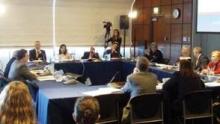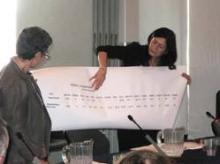SAN FRANCISCO – The cost of sequencing one person’s genome has shrunk from nearly $3 billion 14 years ago to an anticipated $1,000 within the next year or two, a development that positions human genome sequencing to explode into widespread use by researchers and clinicians.
Or maybe not, depending in part on recommendations to President Obama from the Presidential Commission for the Study of Bioethical Issues, which will submit a report on the topic later this year. In preparation, the Commission conducted a day-long public discussion with multiple experts about the potential for medical discoveries from genome research, and the difficulties of protecting patient privacy.
Excitement in some quarters about the already proven ability to diagnose rare disorders via genome sequencing has been tempered by concerns that the field may be moving too fast for the general good. The ability to collect genome data far exceeds the ability to interpret the data. And the growing use of such tests threatens to bankrupt the medical system if it leads to an avalanche of tests for the worried well and untreatable disorders.
Currently, physicians can order sequencing of an individual’s whole exome (all the expressed genes) or whole genome from a few centers on a very limited basis. Approximately 10,000 people had their genomes sequenced in 2011. Perhaps 100,000 will do the same in 2012, estimated Dr. Richard A. Gibbs, director of the Human Genome Sequencing Center at Baylor College of Medicine, Houston.
While many stakeholders emphasize the importance of free and unrestricted release of human genome data to all researchers, others argue that such open access would also allow third parties to manipulate data to deny individuals insurance or employment, he said. The race is on to try to understand genome data better before uninformed interpreters can do their damage. But clearly, having access to lots of genome data is key to advancing the science, he said.
"Less than 1% of the American public understands" genetics, opening the door to manipulation, said Commission Chair Amy Gutmann, Ph.D., president of the University of Pennsylvania, Philadelphia. "There’s a snake oil salesman out there for everything."
Benefits of Unrestricted Access
Among those arguing in favor of the unrestricted access to human genome data to all researchers is Retta Beery. The Baylor center helped diagnose a rare but treatable disorder in her twins, Alexis and Noah. After years of extremely limited mobility, severe breathing problems, costly emergency department visits, imaging tests, and visits to specialists, genome sequencing identified mutations in a gene called SPR that encodes the enzyme sepiapterin reductase. With proper drug treatment, the twins are healthy and high-functioning teenagers today.
"We believe this saved Alexis’s life," Ms. Beery told the Commission. "Weighing privacy versus life-saving treatment – it didn’t balance out at all." The family started a website to support others with similar challenges dealing with dystonia.
Another proponent of unrestricted access, Dr. Daniel Masys described the PREDICT (Pharmacogenomic Resource for Enhanced Decisions in Care and Treatment) project that he helped launch at Vanderbilt University, Nashville, Tenn., in 2010. The system prospectively gathers genome data from patients’ blood samples and makes clinically useful pharmacogenomic information available to physicians and patients through electronic medical records so that the right drug and dose get chosen for a specific patient.
Researchers there also are starting to analyze genomic data in a way that turns the traditional model on its head. Instead of picking a phenotype and looking for associations among all genetic polymorphisms, they pick a genotype and interrogate the set of all phenotypes (diseases) as recorded in the electronic medical records, Dr. Masys explained. Data from DNA "biorepositories" at seven U.S. centers get shared within the eMERGE (Electronic Medical Records & Genomics) Network for conducting genomic studies.
A Long Way to Go
The good news is we have the human genome. The bad news is it’s largely just a parts list," said Dr. Masys, currently an affiliated professor of biomedical and health informatics at the University of Washington, Seattle. "Our ability to acquire person-specific DNA data far exceeds our understanding of its meaning."
To advance the science quickly, genome data from hundreds of thousands or millions of people will be needed to draw clinical correlations. "The principle impediment is that this is a scale of science that we’ve never seen before," Dr. Masys said. He urged the Commission to not let privacy concerns slow the rapidity of this research.




